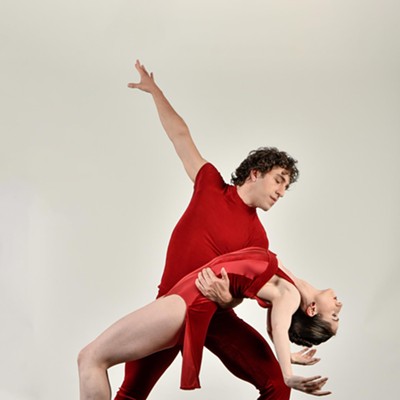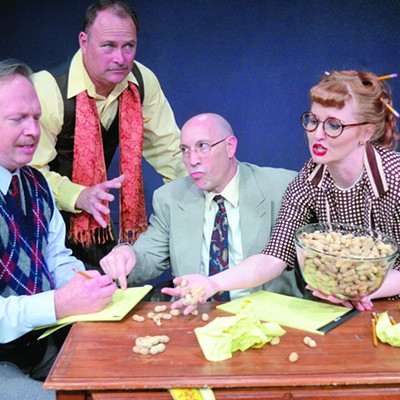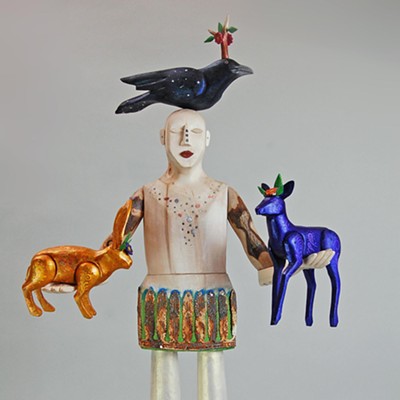Beetles, Bees and Butterflies
SASI Community Day9 a.m. to 3 p.m., Saturday, Aug. 26
Sonoran Arthropod Studies Institute, 7798 W. Gates Pass Road
883-3945; www.sasionline.org
Do you flee in terror when you see a centipede? Do spiders send you screaming to a tabletop? That's probably because you haven't had the right arthropod exposure.
The Sonoran Arthropod Studies Institute (SASI) is determined to change that. Since 1988, this nonprofit museum has provided a lab, a library, a classroom and a collection of thousands of live and pinned arthropod specimens for the edification of its members. And every fourth Saturday of the month (except in December), they host a special Community Day for everyone in Tucson to attend.
The theme of this month's event? Mosquitoes! We all hate those pests, but it can be empowering to know about them, and UA mosquito expert Elizabeth Willott will offer a workshop with lots of information and an up-close look at live and preserved mosquitoes. In addition, Community Day will include a butterfly walk, guest speakers, arts and crafts for kids and a potluck lunch. There will be live animal presentations featuring tarantulas, caterpillars, ants and butterflies, and plenty of opportunities to view all kinds of arthropods under microscopes. You can even take a class on how to make an insect collection of your very own.
This event is especially great for people with kids, says Barb Skye Siegel, SASI's community outreach coordinator. "Kids love bugs! The parents actually show an unnecessary fear of arthropods. Basically, if you know where your hands and feet are, you're safe!" So give your children the exposure you missed while you try to work on your own insect fears--or just come to see some really interesting creatures. The event is completely free--what do you have to lose? For more information, call 883-3945 or visit www.sasionline.org. --A.M.
The Tao of Drumming
Shidara Taiko Group7:30 p.m., Saturday, Aug. 26
Berger Performing Arts Center, 1200 W. Speedway Blvd.
297-9133; www.rhythmandroots.org; www.tucsontaiko.org
I've known a few drummers in my day, and I wouldn't exactly call any of them "spiritual," "interconnected" or "at peace with all things." Don't get me wrong--they're great and dedicated musicians. They're just more into beer than enlightenment.
Then I heard about a whole different kind of drumming.
Taiko, a word meaning "fat drum," originally referred to the instruments in ancient Japan that were used to send messages and coordinate battle troops; they were also used in religious ceremonies. Many thought these drums were inhabited by gods, and they were played mostly by holy men and warriors. Nowadays, taiko refers to a relatively new art form, created in the 1950s by fusing traditional Japanese instruments, culture and religion with modern jazz. It's a form of ensemble drumming that uses percussion, dance and martial arts principles to create a very compelling musical spectacle.
"For me," says Karen Falkenstrom, co-founder of Tucson's taiko organization Odaiko Sonora, "what makes taiko unique and powerful is that it integrates full human potential on all levels: mind, body and spirit. ... Audiences feel the wholeness and completeness--it is thrilling."
This Saturday, Odaiko Sonora and Rhythm and Roots will present a concert by Japanese ensemble Shidara. "Shidara is a world-class taiko group ... with a spirit and direction that distinguishes them," says Falkenstrom. "Shidara brings an experience of what taiko is in Japan for the Japanese. (Their) rhythms and melodies are ones you'd hear if you attended the Hana Matsuri in their mountain home of Toei. ... It is this deep connection with their natural environment, and the way they share that sense of place with their audiences in performance, that sets Shidara apart."
General admission is $22 in advance and $25 at the door. Call 297-9133 for more information. --A.M.
A Woman's Place Is in the Lab
Women in Science Panel Presentation4 p.m., Monday, Aug. 28
UA Life Sciences South, Room 340, 1007 E. Lowell St.
621-9348
Name one really famous female scientist besides Marie Curie. I bet you can't. Sadly, women have been underrepresented in science and engineering since the invention of the wheel.
Things are getting better--in fact, women are now earning bachelor's degrees in science at pretty much the same rate as men, and the percentage of female graduate students in science is steadily rising. But proportionally, women scientists are far less represented than men, and far less likely to be full professors.
The University of Arizona is hosting a panel presentation to address this very problem. A group of UA faculty members, including chemist Dr. F. Ann Walker, entomologist Dr. Molly Hunter and neurobiologist Dr. John Hildebrand, will discuss what female scientists are up to and what we can do to retain and strengthen their presence.
"There is, we believe, cause for optimism," says Carol Bender, UA director of undergraduate biology research. "Mentoring and information-sharing are seen as important strategies for encouraging more students--and particularly female and underrepresented minority students--to pursue science careers. One of the strategies we plan to implement is an e-mentoring system in which any student or scientist can participate."
The panel will also provide information on a series of career nights to take place over the course of the academic year, meant to introduce students to people in the science and engineering fields. Audience members will be allowed to join the discussion, and networking with the career panelists will be encouraged.
"There are a lot of female scientists at the University of Arizona, and elsewhere, who are doing incredibly important and exciting work." Bender says. For more information, call 621-9348. --A.M.
Leaping Lipizzaners
The World Famous Lipizzaner Stallions7:30 p.m., Friday, Aug. 25, and Saturday, Aug. 26
Tucson Convention Center, 260 S. Church Ave.
791-4266; www.ticketmaster.com
I know it's cliché, but I've always been one of those girls who likes horses. The way they look, the way they move ... it's so damn pretty. So imagine my joy when I learned about Lipizzaners--the prettiest horses ever!
Lipizzaner stallions have been bred in Europe for the last 400 years and originally functioned as battle horses, performing intricate military maneuvers that required a lot of strength and agility. They were so valued that they were only ridden by aristocracy, and only royalty could own one. Today, the stallions are trained in dressage, a kind of equestrian ballet involving precise communication between horse and rider. The stallions can bow, prance, trot in place and do lots of other fancy tricks with French names, like the pas de deux and the pas de quatre, military drills in which multiple horses perfectly mirror each other's movements. In their most amazing and beautiful series of movements, called "airs above the ground," the horses perform a capriole, dramatically leaping in the air with their forelegs tucked high under their chest.
This weekend, the World Famous Lipizzaner Stallions will grace Tucson with their royal presence. The performance, promises producer Gary Lashinsky, will be just like the ones at the Spanish Riding School of Vienna, which has been breeding and training Lipizzaners for almost three centuries. But it won't be so classy as to go over the heads of the younger generation, and it's not only for equestrians. "You don't have to be a horse lover to enjoy this show," Lashinsky asserts. But it doesn't hurt!
Adult tickets are $19.50 to $27.50; children and seniors get in for $17.50 to $27.50, and group discounts are available. Call 791-4266 for more information. --A.M.







